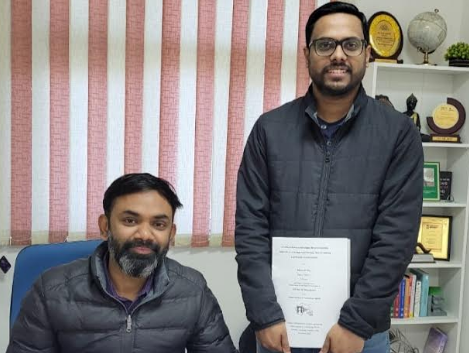IIT Mandi reinvents implant safety with revolutionary anti-bacterial coating
November 07, 2023 | Tuesday | News
To improve therapeutic outcome and experience of patients undergoing orthopaedic or dental surgeries
Image caption- L-R: Dr Amit Jaiswal, Associate Professor, School of Biosciences and Bioengineering, IIT Mandi, with research scholar Dr Shounak Roy
A team of researchers at the Indian Institute of Technology (IIT) Mandi has unveiled an innovative solution to a long-standing problem with medical implants – the risk of infections. A team led by Dr Amit Jaiswal, Associate Professor, School of Biosciences and Bioengineering, IIT Mandi, has introduced an ingenious solution for implant-associated infections by utilising innovative sugar-coated nanosheets as implant coatings.
The research team has devised a biocompatible, non-leaching, and contact-based antibacterial coating for implants, utilising quaternary pullulan functionalised MoS2 (MCP) glycosheets. These cationic MCP glycosheets have been seamlessly applied to the surfaces of polydopamine-modified stainless steel and polyvinyl fluoride substrates through a straightforward electrostatic interaction process.
The developed MCP coating exhibited outstanding anti-bacterial efficacy, effectively eradicating more than 99.5% of Escherichia coli and Staphylococcus aureus bacteria.
A remarkable achievement of this research is that this anti-bacterial performance remains stable for over 30 days without any leaching from the implant surfaces. Furthermore, MCP-coated implants have proven to be entirely safe, inducing neither acute nor sub-chronic toxicity in mammalian cells during both in-vitro and in-vivo testing.
The researchers are in discussion with orthopaedic hospitals to take it forward for clinical trials.










